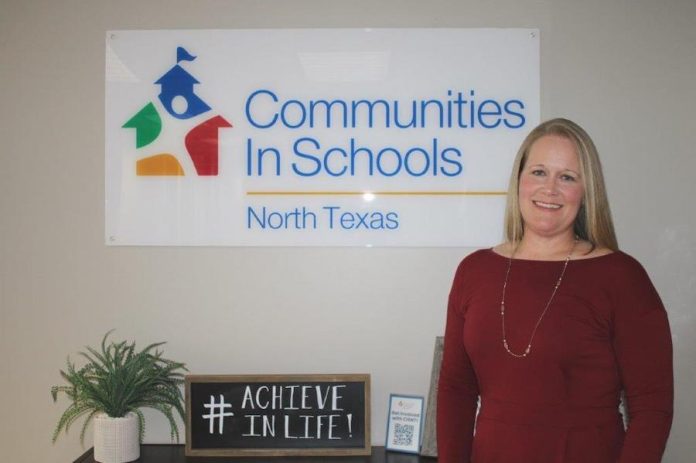Tasha Moore lives for what many might call the little things. Like the countless times she and other dedicated staff and volunteers at Communities In Schools of North Texas took 15 or 20 minutes to help a struggling middle schooler prepare for an important math test—then watched as they sprinted down the hall, test paper in hand, shouting with pride that they passed.
Or the way a student’s face instantly brightens upon hearing that their mentor will be on campus later that day to spend time with them.
Over the years, she has also seen those small moments ripple out to families. The relief on a parent’s face when they learn that their child’s school now offers after-school care—a space for tutoring, a hot meal to hold them over and even a ride home when needed. Meanwhile, countless individuals and businesses donate their time, money and resources to support these efforts.
To some, these might seem like minor victories spread out over Communities In Schools of North Texas’ rich 31-year history.
To the kids and families who benefit, they are life-changing.
“I was impressed with what this organization was doing from the first day I started as a Site Coordinator at Hedrick Middle School (in Lewisville) in 2012. We were in four school districts back then, but my predecessors had incredible foresight to help us keep growing, and I knew this was something I wanted to keep being a part of,” said Moore, who has been the CEO for two years. “Today, we’ve doubled and tripled in size regarding the schools we serve and programs we offer.”
“The things I’ve seen might seem like they are simply a part of the daily lifecycle of being in school,” she said. “But for the kids and parents, it’s huge. It’s extremely humbling to think about the monumental impact we can all make when the community comes together.”
It’s easy to assume schools are well-oiled machines that can meet these needs and more independently. It’s also easy to assume that all kids lead healthy, happy and supported lives in and outside school. But it’s not always that simple.
In North Texas, one in two kids is at risk of dropping out of school. According to the Texas Education Agency, students are considered at-risk if they meet one or more of 14 criteria, including homelessness, Limited English Proficiency, pregnancy or parenting, foster care and if they have one or more incarcerated parents. Many students are also economically disadvantaged and have barriers to academic success.
These realities exist even in thriving local school districts such as Lewisville, Northwest, Denton, Lake Dallas, Gainesville and Bridgeport. Communities In Schools of North Texas partners with these six districts (59 total schools across three counties) to support more than 34,000 students yearly.
By addressing physical, academic, social, emotional and mental health barriers, approximately 99% of students in these districts stay in school and on track for graduation. Last year, 98.2% of CISNT seniors graduated high school, a stat Moore was all too excited to share.
During the 2023-2024 school year alone, Communities In Schools of North Texas had 5,499 case-managed students and provided 875,678 total services to students, families and the community. Examples of those services include providing academic assistance, supplying basic needs such as weekend food support, professional mental health counseling, health and human services, behavioral interventions, college and career prep assistance, community and service learning and parent and family engagement.
Students in these programs ultimately displayed better attendance records, behavior, and academic performance.
Moore said it takes a village to achieve such amazing results nationwide. Communities In Schools of North Texas was founded in 1993 and is one of 27 affiliates in Texas that sprouted from the national organization, which started in Harlem in 1977.
In 1998, CISNT served eight schools. By 2002, that number expanded to 11. Today, it has 110 full-time staff comprising site coordinators, program directors and administration. They also have a part-time crew, over 80 interns and close to 650 volunteers.
“In 1993, a group of educators and leaders in the community recognized that school isn’t always easy, and sometimes, things happen that are beyond a student’s control and directly impact their academics and ability to thrive,” Moore said. “They asked a simple question, ‘How can we put support in place so our kids can be successful?’ As we continued to grow, they noticed how much more work needed to be done. Seven or eight years ago, we started a licensed mental health team that could work in collaboration with our site coordinators to ensure students received the necessary counseling while at the same time reducing the amount of time they were pulled from class for those services. It helped the students, and it also helped their families because it was a service they could access free of charge. It removes a lot of barriers and it’s just one example of what we’ve managed to do over the years.”
Communities In Schools’ reach extends beyond K-12 education. For 14 years, it has partnered with local colleges and universities to provide college students with opportunities to develop professional skills in school settings. In partnership with AmeriCorps, college students receive enhanced career training, leadership development and educational financial credit.
Moore said their goal is to continue adding to their services so they can always be ready when needed. There isn’t a month that goes by when she’s not fielding a phone call from a school district that would like to learn more about what Communities In Schools does and how they can get involved. And there isn’t a day when students don’t face another hardship that must be addressed.
“Our big goal is to be in every school district across our three counties that needs us,” Moore said. “It’s a reminder that so much work is left to be done. We can do more, but it also takes time and help. There’s the financial piece, but we also need more volunteers, and we’d love to have a mentor for every student we serve. Volunteering doesn’t take any special qualifications or certificate—just a willingness to commit 45 minutes a week and a passion to pour into kids.”
She added, “A lot has changed over the years with how we do things. One thing that hasn’t is our commitment to kids.”
Please visit www.cisnt.org to learn more about Communities In Schools of North Texas, including job opportunities, upcoming events and ways to donate time, money and resources to help today’s students.


















